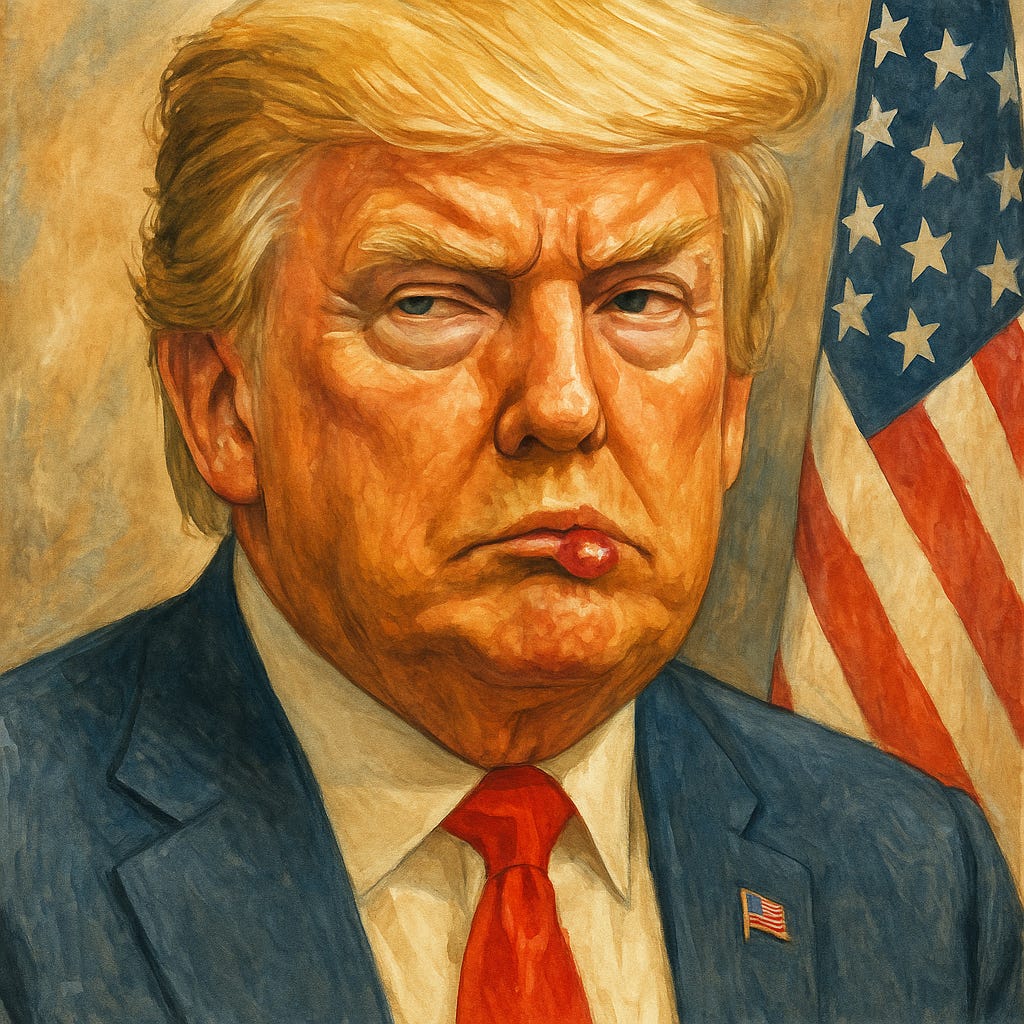I don’t know how “good” Trump is as a legislator or executive. That’s not really the point. What is real is the immune response he triggered.
Millions of people who have felt cowed—ignored, belittled, written off—saw in Trump not a savior, but a signal flare. Not because he’s refined or coherent, but precisely because he’s not. His chaos mirrors their frustration. It is all emotional. This is not about fact-based governance. This is about feelings, rage, resentment, and exhaustion.
Voting for Trump, then and now, is an assertion. It’s not about policy nuance. It’s not even about Trump the man. It’s about disrupting a system they believe has become smug, scolding, and anti-democratic—even if that disruption is messy or cruel.
Whether he’s a bull in a china shop or a blunt-force instrument, the question is: why was that shop so fragile? Why were so many people ready to burn it down just to be heard?
People say he’s “just loud and polarizing.” Well, so was punk rock. So was Malcolm X. So were televangelists and Howard Stern. Loudness is a response to silence, exclusion, and perceived moral domination. Loudness is the tool of the disregarded.
This isn’t just politics. This is cultural immunology. It’s a mass allergic reaction to a moral order that snuck into schools, corporations, nonprofits, and governments—an order defined not by shared values, but by shame, quotas, and curated guilt.
In the first 150 days of Trump’s second term, we’ve watched entire DEI bureaucracies collapse, nonprofits implode, equity policies reversed, USAID defunded, universities fold under protest contradictions. That’s not just Trump—that’s the immune system firing back.
Just look at the Supreme Court’s recent ruling in United States v. Skrmetti, which upheld Tennessee’s ban on gender-affirming care for minors. A 6–3 decision, now the law of the land, despite years of narrative framing that any resistance to youth transition was inherently bigoted. The ruling didn’t come out of nowhere—it was a signal that, under Trump’s renewed mandate, institutions no longer feel they must hide their resistance to progressive cultural norms. It empowers more than 20 other states to enforce similar bans. Whether one agrees or disagrees with the ruling, the shift is undeniable: courts, lawmakers, and governors are no longer pretending to align with the left’s vision of identity justice. They’re acting on what they see as mandated backlash—and they’re doing it openly now.
Universities were once the cultural vanguard. Now they’re the collapsed trench line of a retreating ideology. Students overreached. Administrators bent the knee. And the public stopped buying it.
No, Trump didn’t personally orchestrate all that. He didn’t have to. He became the avatar through which that wave of backlash found permission to manifest. He’s not the architect—he’s the accelerant. The lit match. The cold sore.
And no, I’m not saying these decisions are good, kind, or just. Deportation is violent. Shackling someone and shipping them away is aggression. But America never promised kindness. It promised power and laws.
We confuse "rights" with grace. We want the Constitution to be empathy. It’s not. This country has lived with fascist structures for over 80 years. What it doesn’t like is seeing fascism. It prefers its violence bureaucratic, quiet, outsourced.
Two million people rot in American prisons—torn from families, dehumanized, ignored. But no marches for them. No hashtags. Because when it happens to citizens, it’s "justice." When it happens to migrants, it’s a tragedy or a political wedge.
And let’s not pretend terms like “migrant,” “immigrant,” “illegal alien,” and “undocumented” aren’t shaped by political theater. The terms change to match the mood.
So yes—Trump is a cold sore. Not the virus. The flare-up. The visible symptom of populist-nationalist inflammation. The body politic's angry rash.
He’s not special. He’s allowed to exist by popular demand. 70–80% of Americans hate the tone, tactics, and overreach of DEI, identity politics, and bureaucratic equity culture so much, they’ll break the whole machine to stop it.
Trump offers to sin-eat on their behalf. He’ll be hated, reviled, criminalized—because they won’t do it themselves. He wants their disgust and their loyalty.
And let’s be blunt. His international peers? Putin. Bibi Netanyahu. Strongmen who play to a domestic audience by embracing bad behavior as virtue.
These are Daddy figures. Bootcamp fathers. Tough-love zaddies. Authoritarian isn’t a slur anymore—it’s shorthand for someone finally willing to act. Even if that action is ugly.
And no—I don’t revere Trump. But I understand what he represents. And I understand that ignoring the causes of his rise only strengthens his grip.
It’s not that the voters are stupid or manipulated. The left often treats them like they’re under some kind of moral conservatorship—like what happened to Britney Spears. That same condescending impulse—we know what’s best for you—has infected our politics. It’s a noblesse oblige mindset. Infantilizing. Smothering. All feelings, no respect for agency.
You don’t get to decide someone else’s “best interest.” That’s how you end up with resentment so deep people would rather salt the earth than let you keep gardening.
Trump is not the disease. He’s just the cold sore. And America asked for him.
Appendix
FAQ
Q: Are you defending Trump?
A: No. I’m explaining the cultural and political logic behind his popularity. He’s not good—he’s responsive.
Q: Aren’t identity politics about inclusion?
A: For some, yes. But to others, they represent exclusion, moral coercion, and a denial of voice. Feelings are facts in the current legal and cultural structure.
Q: Isn’t authoritarianism dangerous?
A: Of course. But the public perception has shifted. Authoritarianism now reads to many as “assertive leadership”—a necessary correction to elite drift.
Q: Didn’t Biden oppose sanctuary cities?
A: In 1993, Biden did say sanctuary cities were lawless and destructive. This contradiction between past views and current policy raises questions about who drives the administration.
Glossary
Cultural Immunology: The metaphor that political polarization is an immune system response to perceived ideological infection.
Cold Sore (Trump): A visible symptom, not the root cause—Trump is the flare-up, not the virus.
Sin-eater: A figure who absorbs the blame or moral stain on behalf of others.
Zaddy: Internet slang for a confident, dominant, often older man viewed with affection or irony.
Noblesse Oblige: The notion that elites have a duty to care for the less fortunate—but can morph into moral condescension.
Conservatorship: Legal control over someone deemed incapable of self-management, here used metaphorically to describe elite governance over the public.
Historical Context
Law-and-Order Presidents: Nixon, Reagan, Clinton, and now Trump have all embraced “tough-on-crime” personas. Biden too, with the 1994 Crime Bill.
Law-and-Order Mayors: Giuliani’s New York, Lori Lightfoot’s failed response in Chicago, and now Eric Adams all wrestle with balancing safety and justice.
DEI Retraction: Since 2023, elite universities and corporations have begun rolling back DEI positions under public, legal, and political pressure.
USAID Cuts: Trump’s second term has seen significant cuts to soft-power and NGO-based foreign policy arms, symbolic of nationalist retrenchment.
United States v. Skrmetti: The 2025 Supreme Court decision upholding Tennessee’s ban on gender-affirming care for minors, marking a broader legal greenlight for similar state laws.
Trump’s 2024 Mandate: Trump won the 2024 election decisively, taking the popular vote, Electoral College, Senate, and House—providing a clear signal of public will.
Counterargument
Trump is not a corrective—he’s a catalyst of deeper fracture. His empowerment of the reactionary base may feel like freedom to some, but it risks dismantling shared norms, minority protections, and even democratic institutions. The immune system metaphor cuts both ways: autoimmune diseases kill, too. What feels like defense to one group is escalation to another. Justice without wisdom is vengeance. Order without mercy is tyranny.
Fact Check: True
Biden called sanctuary cities “lawless” in 1993.
DEI roles are being cut across Fortune 500 firms and universities.
Trump won the 2024 election decisively, including the popular vote.
Trump appointed 3 of the 6 Supreme Court justices who ruled in Skrmetti.
Fact Check: False
Trump is not legally a dictator.
DEI is not “banned” in America—only defunded or deprioritized in some states and organizations.
Identity politics is not a single, unified ideology—it’s a broad spectrum of agendas and frameworks.
tl;dr: Trump: The Body Politic's Rash
The provided text, "Trump Isn't The Disease," argues that Donald Trump functions not as the root cause of America's current political climate but as a symptom, or "cold sore," of a deeper societal reaction. The author posits that Trump's rise and sustained popularity are an "immune response" from a significant portion of the population feeling unheard and disrespected by prevailing cultural and political norms, particularly those associated with identity politics and DEI initiatives. This "cultural immunology" is seen as a backlash against a perceived moral order, resulting in a desire to disrupt established systems, even if the methods are chaotic or aggressive. The article emphasizes that voters are not simply manipulated but are actively asserting their agency by supporting Trump as an "accelerant" for widespread institutional changes, illustrated by examples like the Supreme Court's ruling on gender-affirming care. Ultimately, the text frames Trump as a reflection of popular demand for strong, assertive leadership, even if that leadership is controversial, and stresses that understanding this underlying sentiment is crucial to comprehending his political impact.













Share this post